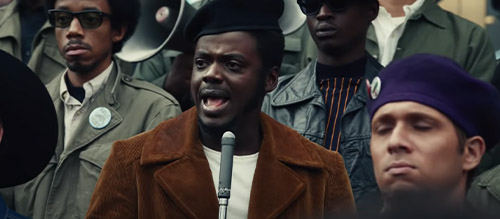Judas and the Black Messiah (2021) Review
Judas and the Black Messiah (2021)
Director: Shaka King
Screenwriters: Shaka King, Will Berson
Starring: Daniel Kaluuya, LaKeith Stanfield, Dominique Fishback, Jesse Plemons
As Daniel Kaluuya’s Fred Hampton, Chairman of the Illinois Chapter of the Black Panther Party says, “you can murder a revolutionary, but you can’t murder a revolution”. Unfortunately, as told in the astonishing true story of Judas and the Black Messiah, that didn’t stop the FBI from trying.
After getting caught stealing a car and impersonating a federal officer, William O’Neal, or Bill (LaKeith Stanfield), is offered an alternative to facing prison – infiltrating the Illinois Panthers and acting as an informant to the FBI. He takes the deal, joins the party, and works his way closer to their leader, Chairman Fred Hampton. A powerful activist and speaker, he’s the man that then FBI director J. Edgar Hoover deemed a ‘messiah’ strong enough to ignite the burning fires of the civil rights movement.
Director Shaka King balances this incendiary slice of history with the suave sheen of a retro crime thriller, tension simmering in every frame. A score of discordant piano and rattling jazz percussion is punctuated by blaring brass sounds, ringing out over the action like the ominous wails of an air raid siren. The Panthers refer to each other as ‘comrades’ and show their solidarity through their uniform of black berets, facing off against the boys in blue. There may not be bombs dropping from the sky, but both sides know this is a war.
Public perception of the Black Panthers is often wrongly distilled down to that of only violence, but Judas and the Black Messiah works to shine a light on just how much good they did for their communities – they provided a political education, ran youth clubs, gave out free meals to those who needed them. Hampton’s Illinois Panthers aren’t afraid to use force when necessary – an explosive firefight in the middle of the runtime is particularly gripping – but theirs is a culture of respect, action and true social organising. It’s a shame more time isn’t spent on fleshing out their progressive political moves, like forming a coalition with Latino group The Young Lords and white group The Young Patriots; an example of how Hampton brought disparate peoples together to tackle the structural forces that oppress them.
If after watching Kaluuya’s extraordinary performances in Get Out, Widows, and Black Panther, you thought that he couldn’t get any more remarkable – you thought wrong. Solidifying his status as one of the most talented and exciting actors of his generation, his Charman Fred is a man with calm, unshakeable confidence and conviction. A vital embodiment of Hampton as a truly gifted orator, his presence is so powerful that it’s easy to see why he became such a target for the American authorities.
Fred’s quieter moments are just as impactful as his bellowing, barnstorming ones, most of them shared with poet and speechwriter Deborah Johnson, played by Dominique Fishback. She is magnetic, and their scenes together have a real sense of intimacy, but Johnson sadly amounts to little more than a love interest despite the clear potential depths to her character.
This is more of a two hander between Fred and Bill, and there’s no actor more up for the challenge of matching Kaluuya’s power than LaKeith Stanfield. He has said that he didn’t approach O’Neal as the villain of the piece, and that comes across in the squirrelly, manic swagger he gives off as the titular Judas, which belies a deeper struggle and perhaps even loyalty to the Panthers.
In the moment, Judas and the Black Messiah feels extraordinary, rousing everything from fear, to heartbreak, to the desire to start a riot as you watch it. On reflection, some elements appear one-dimensional; it only scratches the surface of Fred’s radical politics, how Bill justified committing this betrayal to himself, who Deborah really was, and the wider Black Panther movement. Less a criticism of the film itself, this is more an indication of just how important it is to see stories like that of O’Neal and Hampton on screen, bringing these pieces of history that have been otherwise skewed, erased or misrepresented to a wider audience’s attention.
Shocking, stylish and sure to send Daniel Kaluuya’s career even further into the stratosphere, Judas and the Black Messiah gives us another revolutionary to mourn, as well as reminding us that the war he fought in is nowhere near over yet.
17/24


